
Christianity in Iran: History, Beliefs, and Current Challenges
فرست محتوا
- 1 Christianity in Iran: History, Beliefs, and Current Challenges
- 1.1 History of Christianity in Iran: From Ancient Times to Today
- 1.2 Beliefs of Iranian Christians
- 1.3 Conversion to Christianity in Iran: Human Rights Challenges and International Reactions
- 1.4 International Reactions to Human Rights Violations in Iran
- 1.5 A Story of Resistance and Hope
- 1.6 Execution of Christians in Iran and Global Reactions
- 1.7 International Protests and Efforts to Prevent Executions
- 1.8 A Story of International Solidarity with Christians in Iran
- 1.9 International Support for Christians in Iran
- 1.10 Support from Human Rights Organizations for Christians in Iran
- 1.11 News and International Protests Regarding the Situation of Christians in Iran
- 1.12 Challenges Faced by Christians in Iran
- 1.13 Iranian Laws Regarding Christianity and Conversion
- 1.14 Penalties for Christian Converts in Iran
- 1.15 Experiences of Christian Converts with Violence and Punishments
- 1.16 Christianity and Iranian Art
- 1.17 The Role of Women in the Christian Community of Iran
- 1.18 The Impact of Christianity on Persian Literature
- 1.19 International Interactions of Iranian Christians
- 1.20 The Impact of Christianity in Iran on Daily Life
- 1.21 The Role of Historical Churches in Iran
- 1.22 Christianity and Environmental Issues in Iran
- 1.23 Frequently Asked Questions about Christianity in Iran
- 1.23.1 How have international supports helped save the lives of Christians sentenced to death in Iran?
- 1.23.2 Have global protests had an impact on preventing the execution of Christians in Iran?
- 1.23.3 How do human rights organizations help Christians in Iran?
- 1.23.4 Have international supports improved the situation of Christians in Iran?
- 1.23.5 Is conversion to Christianity allowed in Iran?
- 1.23.6 How can Christian converts maintain their faith?
- 1.23.7 Is Christianity legal in Iran?
- 1.23.8 Are Iranian Christians allowed to build new churches?
- 1.23.9 Is Christianity growing in Iran?
- 1.23.10 Are historical churches in Iran still active?
- 1.23.11 Q: Have legal restrictions for Christian converts in Iran changed?
- 1.23.12 Q: What role do house churches play in preserving the faith of Christians?
- 1.23.13 Q: Does the Christian community in Iran participate in environmental activities?
- 1.23.14 Q: Do Iranian laws allow for the construction of new churches?
- 1.23.15 Q: How has Christian music blended with traditional Iranian music?
- 1.23.16 Q: Is the population of Christian converts in Iran increasing?
- 1.23.17 Q: Why is conversion to Christianity illegal in Iran?
- 1.23.18 How do Christian and Islamic art interact in Iran?
- 1.23.19 Why is the number of Christian converts in Iran increasing?
- 1.23.20 Are house churches legal in Iran?
- 1.24 Conclusion: A Path Towards Religious Freedom in Iran
- 1.25 Summary
Christianity in Iran: History, Beliefs, and Current Challenges
Christianity is one of the oldest Abrahamic religions with followers around the world, including Iran. Despite the Muslim majority in Iran, Christians are recognized as one of the important and influential religious minorities. This article examines the history of Christianity in Iran, the beliefs and rituals of Christians, the challenges facing this community, and its cultural and social impacts in Iran. Additionally, the role of Christianity in international interactions and Iranian culture and art will also be explored.
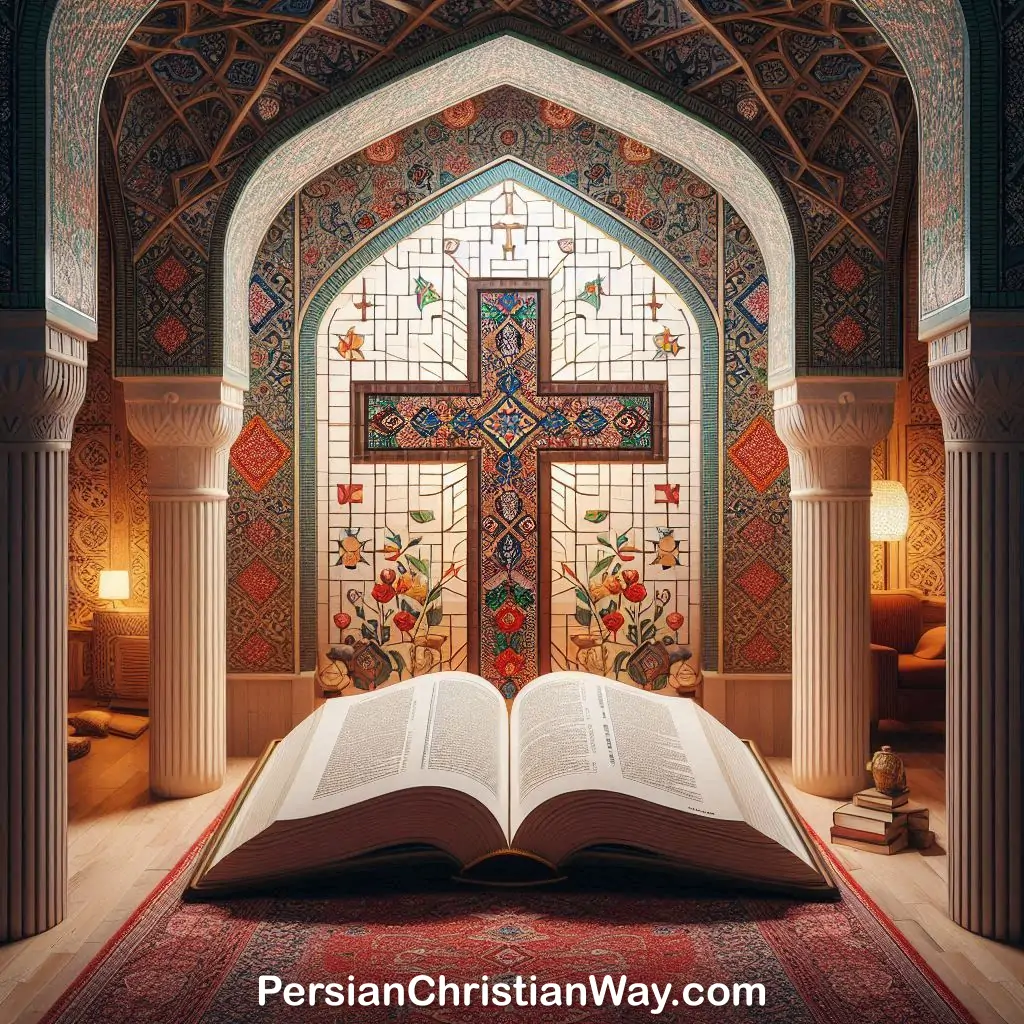 Christianity in Iran: Stained glass cross and Bible in Iranian architecture with traditional tile work
Christianity in Iran: Stained glass cross and Bible in Iranian architecture with traditional tile work History of Christianity in Iran: From Ancient Times to Today
Christianity entered Iran in the first century AD and has maintained its place in Iranian society. The golden age of Christianity in Iran dates back to the Sassanid period when Christians were recognized as an important and influential minority. With the arrival of Islam in Iran, Christians continued their religious and cultural activities, playing a prominent role in the history of Iran despite social and legal restrictions.
Researchers believe that Christianity entered Iran through trade and cultural relations with the Roman Empire and the role of the Assyrians. Many historical churches have been built in Iran, some of which still stand today. For more information about the history of Christianity in Iran, you can refer to related sources.
Expansion of Christianity during the Sassanid Period
Despite officially establishing Zoroastrianism in Iran, the Sassanids allowed Christians to continue their religious activities in the empire. Important churches, such as the Nestorian Church, were established during this period in Iran. Christianity experienced significant growth during this time, and some prominent Christian figures served as advisors in the courts of Sassanian kings.
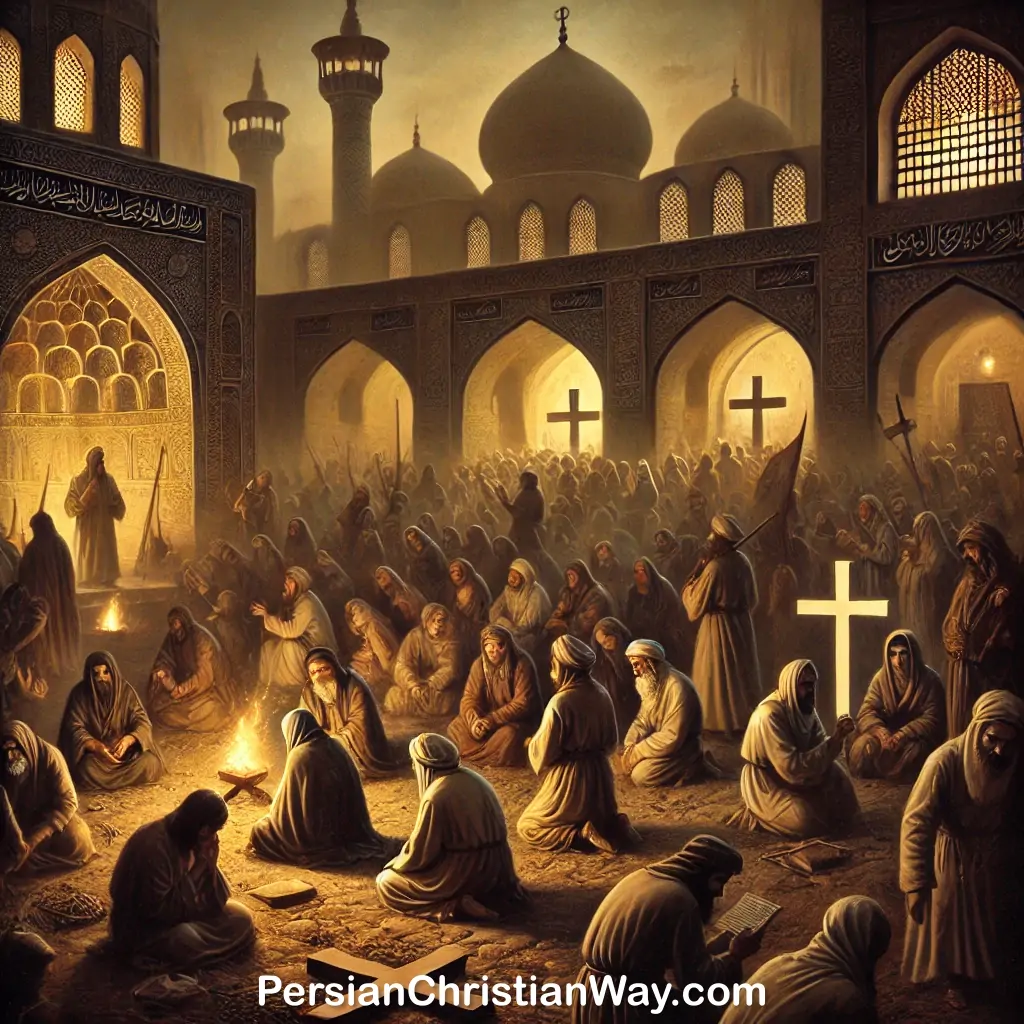 Challenges and dangers faced by Christians in Islamic Iran: Secret worship and hidden Christian symbols
Challenges and dangers faced by Christians in Islamic Iran: Secret worship and hidden Christian symbols Christianity in the Islamic Era
After the arrival of Islam in Iran, Christianity continued to be recognized as one of the official religions. Christians held a special status as “People of the Book” in Islamic laws and were allowed to perform their religious ceremonies. However, social and legal restrictions for Christians have persisted to this day. During the Safavid period, Christians were mainly settled in areas like Armenia and Azerbaijan and maintained their churches.
Beliefs of Iranian Christians
Iranian Christians, like other Christians around the world, believe in the teachings of Jesus Christ. Belief in the birth of Christ from the Virgin Mary, his death on the cross, and resurrection are among the fundamental principles of this faith. Additionally, Iranian Christians adhere to their specific rituals, including the Eucharist and religious celebrations such as Christmas and Easter. These ceremonies are held in cathedrals like the Vank Cathedral in Isfahan. For more information about Christian rituals, you can refer to the Encyclopedia Britannica.
Conversion to Christianity in Iran: Human Rights Challenges and International Reactions
Conversion to Christianity in Iran is a very sensitive and controversial issue that faces serious legal and social challenges, as well as dangers such as torture, imprisonment, and even execution. These actions against Christian converts have led to widespread violations of human rights and religious freedoms, provoking strong international reactions. Human rights organizations and many Western countries have repeatedly condemned these actions and called for improvements in the human rights situation in Iran. This article examines the details of these challenges, global reactions, and international efforts to support Christian converts.
Penalties for Converting to Christianity and Their Impact on Converts’ Lives
The penalties for converting to Christianity in Iran can include long-term imprisonment, physical and psychological torture, and even the death penalty. These conditions are especially harsher for those who participate in religious and missionary activities. Many Christian converts are systematically tortured after their arrest to abandon their beliefs. One well-known case is the story of “Reza Panahi,” who was subjected to severe physical pressure and threats of death after being arrested for participating in house churches, in an attempt to force him to return to Islam.
International Reactions to Human Rights Violations in Iran
The international response to human rights violations in Iran due to the treatment of Christian converts has been extensive. Western countries and human rights organizations have consistently condemned the violation of religious rights in Iran and called for an end to these behaviors. In 2022, the United Nations published a report detailing the violations of Christians’ rights in Iran. This report showed how Christian converts are subjected to psychological and physical pressures, and their basic rights, including the right to religious freedom, are continuously violated.
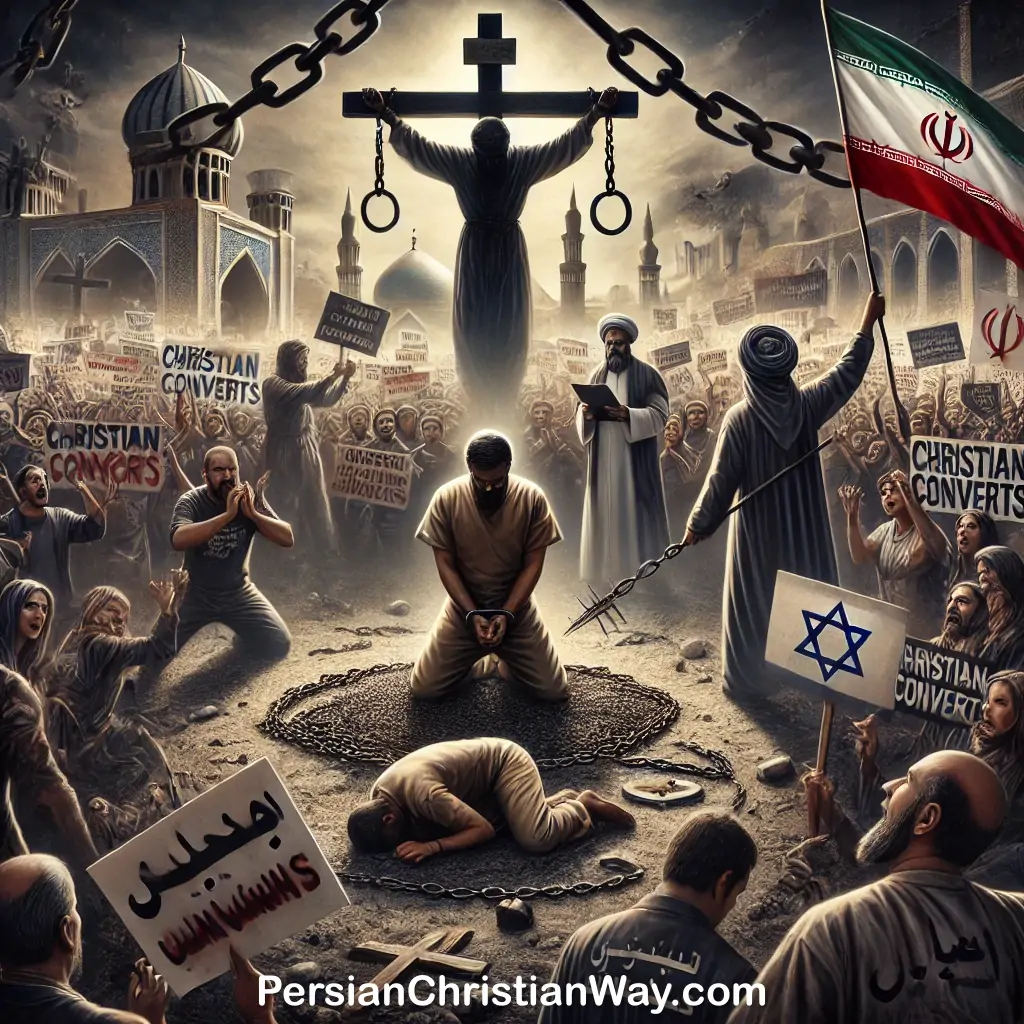 Global support and violence against Christian converts in Iran: Protests and executions
Global support and violence against Christian converts in Iran: Protests and executions Global Protests and Foreign Support for Christian Converts
In response to the execution and torture of Christian converts, many countries and international organizations have reacted strongly. In 2023, large protests were held in front of Iranian embassies in major European cities such as Paris, London, and Berlin. Participants in these protests carried placards with slogans like “No to execution for faith” and “Freedom for Christians in Iran,” demanding an end to the harassment of Christian converts in Iran. These protests increased diplomatic pressure on Iran, and some countries even imposed targeted sanctions against Iranian officials involved in these rights violations.
Information Table: International Support for Christian Converts in Iran
| Country/Organization | Year | Type of Support | Description |
|---|---|---|---|
| European Parliament | 2023 | Condemnation Resolution | Issuance of a resolution condemning the execution of Christian converts and calling for their release. |
| Amnesty International | 2022 | Human Rights Report | Publication of a report on the violation of the rights of Christian converts and a call to end these actions. |
| Canada | 2021 | Targeted Sanctions | Imposition of sanctions against Iranian officials involved in the violation of Christians’ rights. |
A Story of Resistance and Hope
One impactful story is about “Nazanin,” a Christian convert who was tortured severely after her arrest for converting. However, with the help of human rights networks and international support, Nazanin managed to escape from prison and seek asylum in one of the European countries. This story is not only an example of individual courage but also demonstrates the power of solidarity and international support in saving lives and protecting religious rights.
Quote from International Officials
In one of her statements, the Canadian Foreign Minister said: “We are deeply concerned about the human rights situation in Iran, especially the execution and torture of Christian converts. Changing one’s religion should be a personal right, and no one should be harassed for their faith.” Such statements reflect global solidarity in defending religious rights and freedom of belief.
Execution of Christians in Iran and Global Reactions
The execution of Christians in Iran for conversion and apostasy is one of the biggest human rights challenges in the country, which has received significant international attention. Many human rights organizations and foreign countries have condemned these actions as violations of basic human rights, especially religious freedom. These events have led to severe global reactions, protests, and condemnatory statements aimed at increasing pressure on the Iranian government to respect the rights of religious minorities.
Cases of Executions of Christians and Global Support
One example of the execution of Christians in Iran is the case of a man named Hamid Naseri in 2018, who was sentenced to death for apostasy and converting from Islam to Christianity. This action prompted international organizations such as Amnesty International and Human Rights Watch to react strongly and call for an end to such punishments. Additionally, in 2019, Mojgan Rahimi, a Christian convert, was sentenced to death after an unfair trial. This issue faced widespread international backlash and sparked a wave of protests.
International Protests and Efforts to Prevent Executions
The execution of Christians in Iran has led to protests in many European and North American countries. One of the largest protests took place in London in 2019, where participants held placards with slogans like “Freedom for Christians in Iran” and “No to execution for faith,” demanding an end to these actions. These gatherings not only garnered global support but also increased pressure on the Iranian government.
Information Table: Global Support for Christians Sentenced to Death in Iran
| Country/Organization | Year | Type of Reaction | Description |
|---|---|---|---|
| European Union | 2019 | Official Statement | Condemnation of the execution of Christians in Iran and a call for respect for religious freedoms and human rights. |
| Canada | 2020 | Sanctions | Imposition of targeted sanctions against Iranian officials involved in the violation of Christians’ rights. |
| United Nations | 2021 | Human Rights Report | Publication of a report on the violation of the rights of religious minorities and condemnation of the execution of Christian converts. |
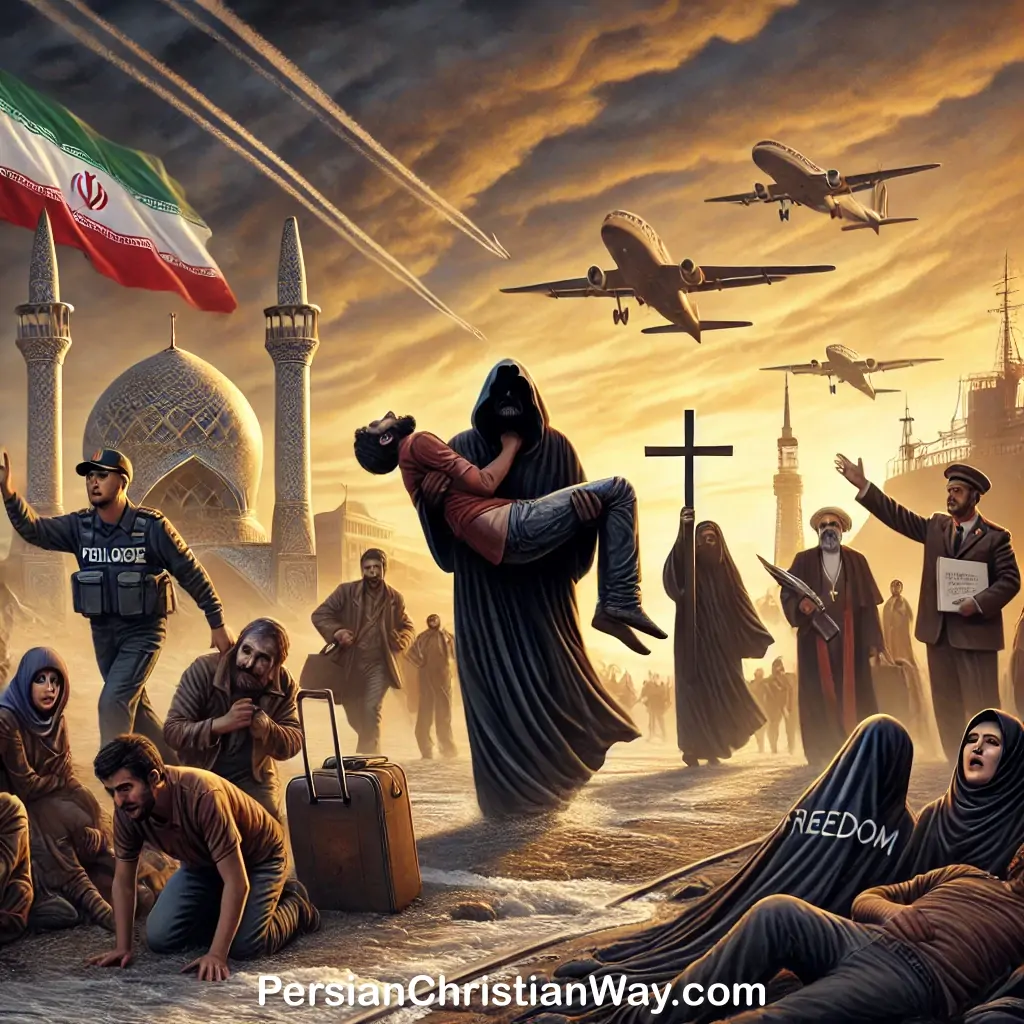 International support for Iranian Christian refugees: fleeing the threat of execution and imprisonment
International support for Iranian Christian refugees: fleeing the threat of execution and imprisonment A Story of International Solidarity with Christians in Iran
In 2020, the story of a Christian convert named “Hossein” gained significant attention due to international efforts. Hossein, who was arrested and sentenced to death for promoting Christianity, successfully left Iran and sought asylum in Canada with the support of several human rights organizations and international pressure. This story exemplifies the impact of global support in saving lives and highlights the importance of international solidarity in addressing human rights violations.
International Support for Christians in Iran
The issue of Christianity in Iran and the harsh treatment of Christian converts has drawn the attention of many foreign organizations and countries. In recent years, human rights organizations and international officials have repeatedly expressed their concerns about the situation of Christians in Iran and the severe punishments against them. This support has taken various forms, including official statements, sanctions, and even diplomatic efforts for the release of Christian prisoners. The international community seeks to raise awareness about human rights violations and prevent the continued persecution of Christians in Iran.
Quotes from Foreign Officials about Christianity in Iran
In one of his speeches, the German Foreign Minister stated: “We cannot remain silent in the face of blatant violations of human rights and religious freedom in Iran. The right to choose one’s religion and beliefs is one of the fundamental human rights, and the international community must strive to protect this right.” Additionally, a member of the British Parliament stated in an interview: “The persecution of Christians in Iran is unacceptable, and we must use all diplomatic tools to stop these behaviors.”
Support from Human Rights Organizations for Christians in Iran
Various organizations such as Amnesty International and Human Rights Watch have published reports on the situation of Christians in Iran. These organizations aim to increase international pressure on the Iranian government by publishing documented reports and conducting awareness campaigns. For example, in 2021, Amnesty International published a report on the detention and torture of Christian converts in Iran, highlighting the violation of their basic rights. This report received widespread media attention, and many countries called for an end to the persecution of Christians.
Information Table: Examples of International Support for Christians in Iran
| Organization/Country | Year | Type of Support | Description |
|---|---|---|---|
| Amnesty International | 2021 | Report and Campaign | Publication of a report on the detention and torture of Christian converts in Iran and a call to end the violation of their rights. |
| European Union | 2020 | Official Statement | Expressing concern over human rights and religious freedom violations in Iran and calling for the release of Christian prisoners. |
| U.S. Department of State | 2019 | Targeted Sanctions | Imposition of targeted sanctions against Iranian officials involved in the violation of Christians’ rights. |
News and International Protests Regarding the Situation of Christians in Iran
International protests regarding the situation of Christians in Iran have been a significant factor in increasing pressure on the Iranian government. In recent years, numerous protests have been held in various cities around the world, such as London, Berlin, and New York, where participants have called for the release of Christian prisoners and an end to religious persecution in Iran. These protests have been supported by international media and have raised public awareness about the situation of Christians in Iran.
A Story of International Support
In 2019, the story of a convert named “Sara” attracted international media attention. Sara, who was arrested for converting to Christianity, managed to leave Iran and seek asylum in one of the European countries after several months of imprisonment and torture, with the help of a human rights organization. This story exemplifies the successful efforts of international organizations to support Christian converts and highlights the importance of global solidarity against human rights violations.
Quote from the Bible
“Jesus said, ‘I am the way, the truth, and the life. No one comes to the Father except through me.'” (John 14:6)
Challenges Faced by Christians in Iran
Christians in Iran face various challenges. One of the main challenges is the legal restrictions on holding religious ceremonies and performing religious rituals. Additionally, converting from Islam to Christianity in Iran is met with severe penalties. Many Christians have been forced to leave the country in recent years, migrating to countries like Armenia or the United States.
However, the Christian community in Iran continues to strive to preserve its religious and cultural identity. Many Iranian Christians are active in various fields such as art, business, and education, playing an important role in Iranian society. For more information on the legal challenges faced by Christians and other religious minorities in Iran, reports from Human Rights Watch can be useful.
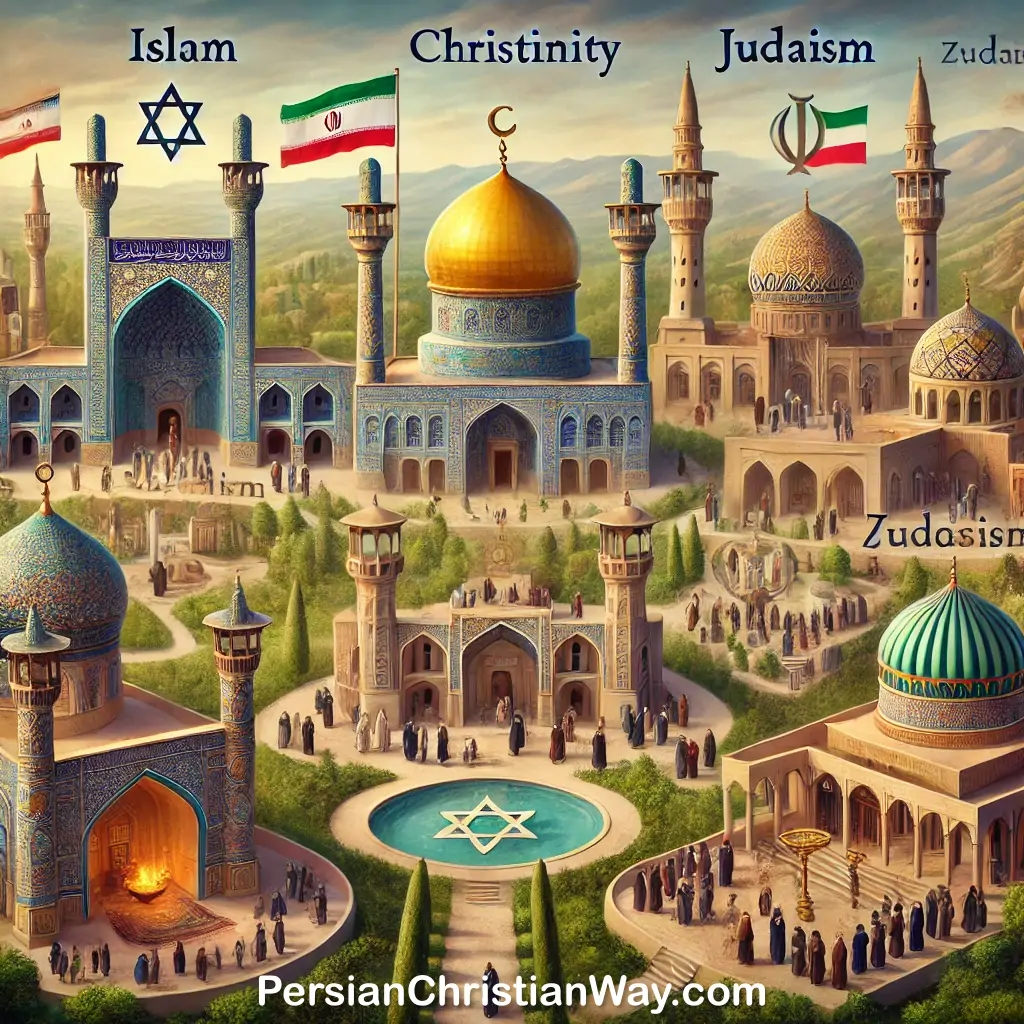 Religious diversity in Iran: Islam, Christianity, Judaism, Zoroastrianism, and Bahá’ism
Religious diversity in Iran: Islam, Christianity, Judaism, Zoroastrianism, and Bahá’ism Comparative Table: Christianity and Other Religions in Iran
| Religion | Approximate Population | Geographical Location |
|---|---|---|
| Islam | 99% | All over Iran |
| Christianity | Less than 1% | Mainly in Urmia, Tehran, and Isfahan |
| Zoroastrianism | Less than 0.1% | Yazd and Kerman |
Iranian Laws Regarding Christianity and Conversion
The laws of the Islamic Republic of Iran regarding conversion to Christianity are very strict. According to current laws, converting from Islam to Christianity is considered apostasy and may be met with severe penalties, including imprisonment or even execution. These laws are based on Islamic jurisprudence and view conversion as an illegal act that threatens the Islamic system. These strict measures have forced many Christian converts to conduct their religious activities underground.
Quotes from Religious Officials in Iran Regarding Apostasy
Some religious officials in Iran have strongly condemned conversion from Islam to Christianity. For example, in one of the Friday prayer sermons, a Friday prayer leader stated: “Any Muslim who turns to another religion, especially Christianity, is considered an apostate, and their punishment in this world and the hereafter will be severe.” Such statements reflect the strict approach of religious and judicial authorities in Iran towards conversion.
Penalties for Christian Converts in Iran
Christian converts in Iran face various penalties. These penalties include long-term imprisonment, deprivation of social rights, and even the death penalty. In some cases, Christian converts have been subjected to physical and psychological abuse after their arrest to force them to abandon their beliefs. This pressure has led many converts to leave the country or continue their lives under difficult and unstable conditions.
Information Table: Examples of Violence and Punishments Against Christian Converts in Iran
| Name | Year of Arrest | Type of Punishment | Description of Incident |
|---|---|---|---|
| Maryam Noori | 2018 | 10-year imprisonment | Arrested and sentenced to imprisonment for promoting Christianity and holding house meetings. |
| Mohammad Alizadeh | 2020 | Execution | Sentenced to death for apostasy and converting from Islam to Christianity. |
| Reza Hosseini | 2019 | Imprisonment and torture | Arrested for participating in a house church and subjected to physical and psychological torture. |
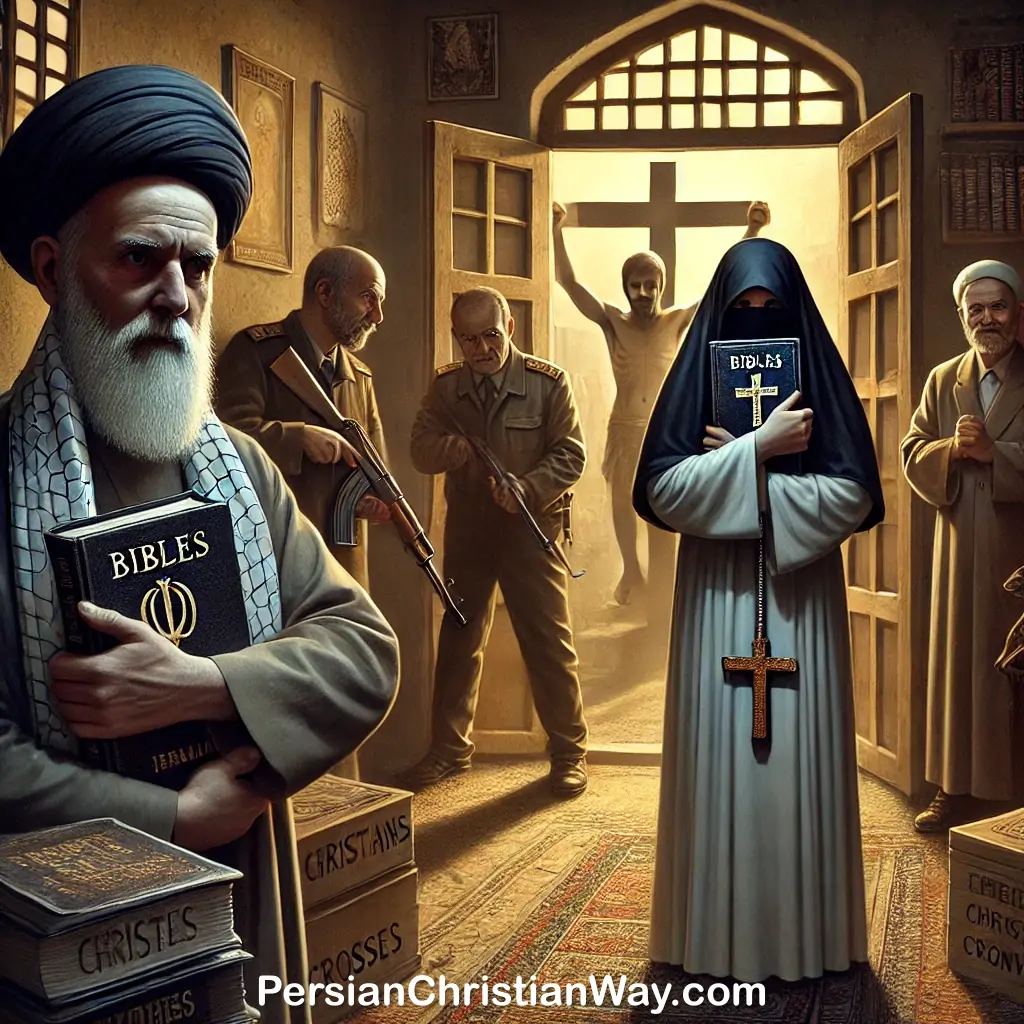 Christian converts in Iran: Supervision by authorities and religious challenges
Christian converts in Iran: Supervision by authorities and religious challenges Experiences of Christian Converts with Violence and Punishments
The experiences of Christian converts in Iran are filled with challenges and hardships. Many have reported that after their arrest, they faced severe pressures to abandon their faith. These pressures include physical torture, threats of execution, and even attempts to destroy their family relationships. In one case, a man named Ali Rahmani, who had converted to Christianity, reported that after his arrest, security forces threatened to harm his family to force him to return to Islam.
Christianity and Iranian Art
Christianity has had a profound impact on Iranian art, especially during the Safavid period. The wall paintings and decorations of the Vank Cathedral in Isfahan are a prominent example of these influences, showcasing a blend of Islamic and Christian art. In this church, paintings with biblical themes are seen alongside Iranian architectural elements such as colorful tile work, presenting a unique display of the coexistence of two cultures.
The Role of Religious Music in Iranian Christianity
Music is an important component of Christian rituals. In Iranian churches, especially in the Armenian community, religious music forms a significant part of religious ceremonies. This music is often performed using traditional Iranian instruments such as the santur and tar, creating a beautiful blend of Christian and Iranian culture.
The Role of Women in the Christian Community of Iran
Women play a vital role in preserving and promoting religious traditions within the Christian community in Iran. Many Christian women serve as teachers, religious leaders, and artists in their communities. They also play key roles in conducting religious ceremonies such as the Eucharist and annual celebrations. These roles are especially important in preserving the cultural and religious identity of the Christian community in Iran.
The Role of Education in Preserving Christian Identity
One of the main tools for preserving the religious and cultural identity of Iranian Christians is education. Christian schools in Tehran, Isfahan, and Urmia teach religious principles and the Armenian language, helping Christian children become familiar with their culture and history. These schools play an important role in transmitting religious knowledge to new generations.
The Impact of Christianity on Persian Literature
Christianity has also influenced Persian literature. Some Iranian poets have referenced Christian themes in their poetry. For example, in the poems of Hafez and Rumi, there are references to Christ and Mary, indicating cultural interactions between Muslims and Christians throughout Iranian history. These references reflect a mutual respect and positive interaction between the two religions.
Examples of Poetry Related to Christianity
The breath of Jesus will rise for your sake from the tavern
Even though your wine never makes me drunk (Hafez)
In this poem, Hafez refers to the “breath of Jesus,” symbolizing the sanctity and healing power of Jesus Christ. Such references illustrate the cultural interplay between Christianity and Islam in Persian literature.
International Interactions of Iranian Christians
Iranian Christians have played an important role in international interactions. For example, the Armenian community in Iran has strong ties with Armenia and other Armenian communities around the world. These connections not only help preserve the cultural identity of Armenians but also play a role in strengthening cultural and commercial relations between Iran and other countries.
International Support for the Christian Community in Iran
In recent years, some international organizations have supported the rights of religious minorities in Iran. These organizations seek to promote religious freedoms and reduce religious restrictions. The Christian community in Iran has benefited from this support to maintain and expand its religious and cultural activities.
The Impact of Christianity in Iran on Daily Life
Christianity in Iran has had profound effects on various aspects of daily life for some communities. From religious rituals to lifestyle and social interactions, Iranian Christians have tried to continue their lives within Iranian society while preserving their values. These impacts include participation in religious celebrations such as Christmas and Easter, supporting family and community, and addressing issues such as education and helping the needy. The Christian community in Iran plays a positive role in the cultural and social development of the country by utilizing its religious and social institutions.
Trends in the Population Changes of Christians in Iran
In recent decades, the population of Christians in Iran has experienced changes. Despite legal and social restrictions, many Christians are striving to maintain their presence in society. The Iranian Christian population mainly consists of Assyrian and Armenian ethnic groups, but in recent years, reports have emerged indicating an increase in the number of Christian converts. These demographic changes have occurred through migration, conversion, and interest in Christian teachings. This trend reflects individuals’ desire to seek spirituality and religious freedom.
The Role of Historical Churches in Iran
Historical churches in Iran are recognized not only as places of worship but also as cultural heritage. These churches, combining Islamic and Christian art, exemplify cultural coexistence in Iran. The Vank Cathedral in Isfahan and the Qara Kelisa in northwestern Iran are among the historical buildings that host many tourists and researchers each year. These churches serve a purpose beyond being places of worship and are recognized as symbols of cultural diversity and Iran’s rich history.
Experiences of Christian Converts in Iran
Christian converts in Iran face various challenges and experiences. Converting from Islam to Christianity is a sensitive issue that may bring legal and social problems for individuals. However, many converts continue their religious activities through underground networks and support from house churches. These groups are formed not only for worship but also to strengthen social relationships and provide spiritual support. Despite all the restrictions, the faith of Christian converts remains steadfast.
Christianity and Environmental Issues in Iran
The Christian community in Iran is increasingly involved in environmental and sustainability issues. Churches and Christian organizations are working to raise public awareness about the importance of environmental preservation by organizing awareness events and social activities. These activities include tree planting, neighborhood clean-ups, and encouraging the use of sustainable resources. Iranian Christians, inspired by their religious teachings that emphasize caring for God’s creation, contribute to promoting an environmental culture.
Frequently Asked Questions about Christianity in Iran
How have international supports helped save the lives of Christians sentenced to death in Iran?
International support for Christians sentenced to death includes diplomatic pressure, publication of human rights reports, and targeted sanctions against responsible officials. These actions have, in some cases, led to reduced sentences or even saved lives.
Have global protests had an impact on preventing the execution of Christians in Iran?
Yes, global protests and support from international organizations have played a significant role in raising public awareness and pressuring the Iranian government. These pressures have, in some cases, led to the suspension or reduction of sentences for Christian converts.
How do human rights organizations help Christians in Iran?
Human rights organizations work to support the rights of Christians in Iran by publishing documented reports, conducting awareness campaigns, pressuring governments, and providing legal assistance to Iranian Christians. These organizations play a crucial role in raising public awareness and drawing global attention to the situation of Christians in Iran.
Have international supports improved the situation of Christians in Iran?
International support has helped raise public awareness and pressure the Iranian government, but significant challenges remain for improving the situation of Christians in Iran. However, this support has enabled some converts to successfully leave Iran and seek asylum.
Is conversion to Christianity allowed in Iran?
No, converting from Islam to Christianity is considered illegal in Iran and may be met with severe penalties, including imprisonment or execution. These laws are based on Islamic jurisprudence and view conversion as apostasy.
How can Christian converts maintain their faith?
Christian converts in Iran typically continue their religious activities underground and in house churches. These churches serve as places for worship, education, and mutual support. However, the activities of these churches also carry significant risks, and their members may be arrested.
Is Christianity legal in Iran?
Yes, Christianity is recognized as one of the official religions in the Iranian constitution. Christians are allowed to perform their religious ceremonies, but they face restrictions, including government control over religious activities and churches.
Are Iranian Christians allowed to build new churches?
The construction of new churches in Iran rarely occurs due to strict government regulations. Many existing churches have remained since ancient times and often require repair and restoration. Christianity Today has provided detailed reports on the status of churches and Christian communities in Iran.
Is Christianity growing in Iran?
Although Christianity is recognized as a minority religion in Iran, it is reported that the number of Christians, especially among ethnic minorities like Assyrians and Armenians, continues to increase. This growth primarily occurs due to migration and conversion.
Are historical churches in Iran still active?
Yes, many historical churches in Iran remain active and are used as places of worship and cultural significance. The Vank Cathedral in Isfahan and the Holy Mary Church in Tehran are examples of these churches, which are recognized not only for worship but also as tourist attractions.
Q: Have legal restrictions for Christian converts in Iran changed?
A: No, legal restrictions for Christian converts remain in place. Converting from Islam to Christianity is considered illegal in Iran and is subject to severe penalties, including imprisonment and even execution.
Q: What role do house churches play in preserving the faith of Christians?
A: House churches help Christian converts maintain their faith under legal restrictions. These churches serve as places for worship, education, and spiritual support for the underground Christian community.
Q: Does the Christian community in Iran participate in environmental activities?
A: Yes, churches and Christian organizations in Iran contribute to promoting sustainability and environmental preservation by organizing environmental events, such as tree planting and neighborhood clean-ups. These activities are inspired by Christian teachings on caring for God’s creation.
Q: Do Iranian laws allow for the construction of new churches?
A: The construction of new churches in Iran rarely occurs and faces severe government restrictions. Many existing churches have remained since ancient times and require maintenance and repair.
Q: How has Christian music blended with traditional Iranian music?
A: Religious music of Iranian Christians, especially Armenians, is often performed using traditional Iranian instruments such as the santur and tar. This beautiful combination reflects cultural and religious coexistence in Iran.
Q: Is the population of Christian converts in Iran increasing?
A: Yes, the number of Christian converts in Iran has increased for various reasons, such as the search for spirituality and interest in the teachings of love and forgiveness in Christianity. These changes have been facilitated by connections with international Christian communities and the use of social media.
Q: Why is conversion to Christianity illegal in Iran?
A: Converting from Islam to Christianity is recognized as apostasy in Iran and is associated with severe penalties. These laws are based on Islamic jurisprudence and view conversion as a threat to the Islamic system.
How do Christian and Islamic art interact in Iran?
Christian and Islamic art in Iran have interacted in various ways. Examples of these interactions can be seen in the decorations of Armenian churches that combine Islamic architectural elements, such as colorful tile work, with Christian symbols. This interaction reflects coexistence and cultural mutual influence throughout history.
Why is the number of Christian converts in Iran increasing?
The increase in the number of Christian converts in Iran is attributed to various reasons, including the search for spirituality, interest in the teachings of love and forgiveness in Christianity, and the need to feel a sense of belonging to a spiritual community. Additionally, access to religious resources and connections with international Christian communities through the internet and social media have contributed to this trend.
Are house churches legal in Iran?
House churches in Iran typically operate informally due to existing restrictions on freely holding religious ceremonies and are not considered legal by the government. However, these churches play an important role in preserving faith and strengthening the spirit of the Christian community.
Conclusion: A Path Towards Religious Freedom in Iran
Conversion to Christianity in Iran remains one of the serious human rights challenges that has faced widespread international reactions due to severe penalties, torture, and threats of execution. Global protests, support from human rights organizations, and diplomatic efforts from various countries demonstrate a global commitment to defending religious freedom and fundamental rights. With the continuation of these efforts and international pressure, there is hope that the Iranian government will respect human rights and religious freedom, and the living conditions of Christian converts will improve. Ongoing solidarity and international attention to end these fundamental rights violations are of utmost importance and can pave the way for religious freedom in Iran.
Summary
Christianity in Iran, with a long and complex history from the Sassanid era to the present, continues to be recognized as one of the important minority religions. Iranian Christians continue their religious activities despite social and legal challenges and play a prominent role in society. This article examines the history, beliefs, and challenges of Christians in Iran, demonstrating that this faith remains alive and vibrant.





